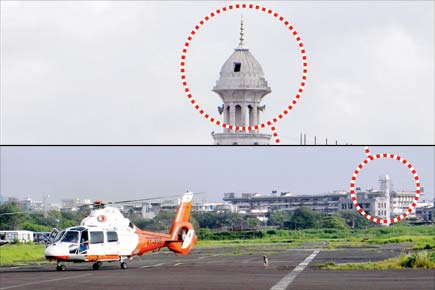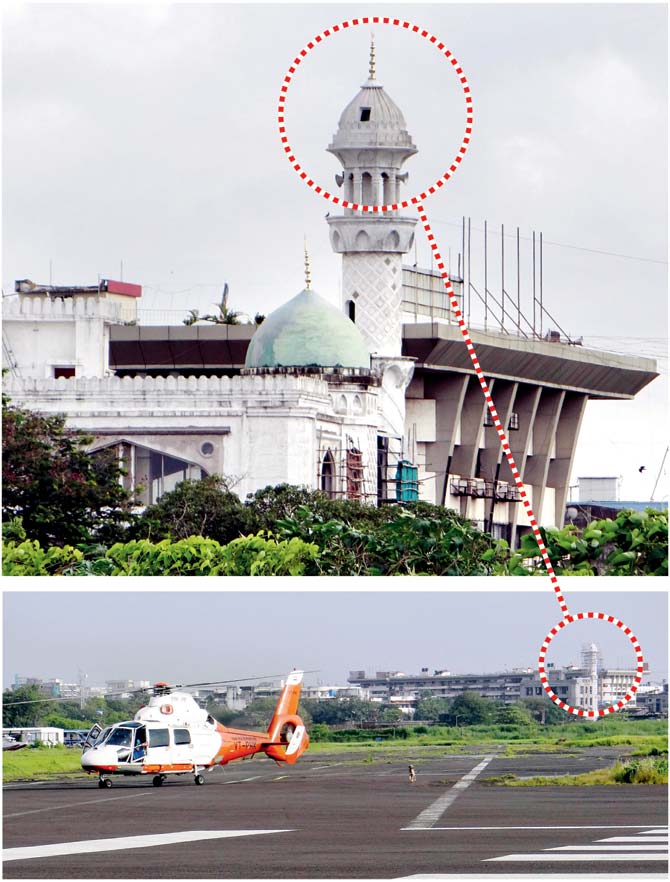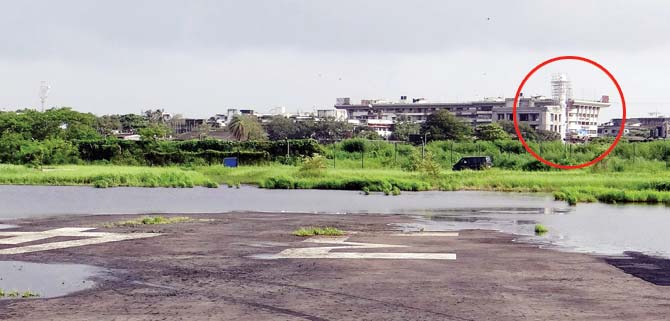As a 37-metre-tall minaret of a nearby mosque stands in its way, the Airports Authority of India plans to issue a notice to Juhu airport to shorten its 732-metre runway by 300 metres

The Airports Authority of India plans to issue a notice to Juhu airport to shorten its runway by 300 metres, which will reduce the 732-metre strip by almost half and jeopardise operations. Sources said at least 40 per cent of operations, mainly by Pawan Hans and ONGC, will be hit.
ADVERTISEMENT
Also Read: Mumbai's 31-year-old secret: Juhu airport sitting on land for sports complex

The minaret stood at 34 metres on construction in 2012. A spire was placed atop the minaret last year, taking its height to 37 metres
A Notice to Airmen (NOTAM) to this effect will be issued after the AAI ruled that the minaret of a mosque abutting the airport’s boundary is a threat to aircraft using the facility. This, according to the experts, will affect the operations of the helicopters, as the secondary runway 16-34 carries 40 per cent of the helicopter operations.
Read Story: India's oldest airport to now get adequate security

At its current height, the minaret remains a threat for choppers. However, shortening the runway will also pose a hazard to take-off and landing
The controversial minaret, which is an obstruction for operations at both Juhu’s secondary runway and the Mumbai International Airport’s secondary runway, came up in 2012 and has since been posing problems to operations at Juhu airport.
While structures around Juhu are capped at 26.12 metres, the minaret stood at 34 metres on construction. The mosque trustees maintained that they had all requisite permissions. A spire was placed atop the minaret last year, taking its height to 37 metres, after which it became a threat to flights using the main airport’s secondary runway also.
Also Read: Juhu airport main runway shut down for 3 hours due to stuck fire engine
While the NOTAM will be issued to Juhu, Mumbai International Airport Pvt Ltd (MIAL) has refused to shorten its runway as advised by AAI. Pilots mid-day spoke to, said they are hit from both sides — while the minaret remains a threat at its current height, shortening the runway will also pose a hazard to take-off and landing.
Not just Juhu airport, the minaret also poses trouble for the main Mumbai airport. Explained a senior MIAL official, “The very same minaret is also an obstacle for Runway 9 at Mumbai airport. If a similar action were contemplated there, it would necessitate 600 metres of displaced threshold. Runway 9 handles all heavy aircrafts, including A-380 and AN-124, and is the preferred runway from October to January, due to prevailing wind conditions.”
A Juhu airport official explained, “Just as Mumbai airport uses Runway 14 due to headwinds, helicopter operators at Juhu are forced to use Runway 34 under tailwinds conditions, necessitating a longer runway to ensure safety. Any reduction of the length of Runway 34 at Juhu airport will adversely affect the helicopter operations.”
Mumbai airport officials have also brought the minaret issue to the notice of the BMC. A recent letter written to the H-west ward on September 29 this year (accessed by mid-day) states, “The top elevation of the minaret as measured by MIAL representatives was 33.7 m and the same is penetrating the approach surface of Runway 09 by 7.67M. Also, recently, it is learnt that the mosque authorities have increased the height of the minaret by installing a spire and, as of now, the height is an obstacle in the approach surface of Runway 09. We have also been informed by the Airports Authority of India (AAI) that no height clearance NOC was granted in favour of the mosque. In view of the above, for safety of aircraft operations at CSIA, it is requested that necessary actions may please be initiated immediately to reduce the height of the minaret.”
President of Rotary Wing Society of India (RWSI), Western Region, Uday Gelli said, “RWSI has learnt that yet again the AAI is considering shifting the threshold on runway 34, as well as closing runway 16-34. So RWSI has taken up the matter with the ministry of Civil Aviation requesting that runway 16-34 should be maintained as an active runway without any change in the threshold of the runway.”
A senior ONGC official close to the development expressed disappointment at this development. “The minimum requirement of operating the helicopters is 600 metres. The operations are open from dawn to dusk. This is the only window to Bombay High, where more than 50 flights land daily. Suddenly if there is a go-ahead with this order, under these constraints, pilots will refuse to fly with this load and will reduce it to half. It is the government of India, as well as the ONGC, who will be the loser in this situation,” he said.
Juhu’s runway has been under threat for the past three years, prompting allegations that developers are trying to force the airport to shut down. If the Juhu airport shuts down, 400 acres of land around it will come up for development and result in a windfall to landowners and builders.
GM (Operations), AAI, VSP Chinson said that they could not comment on a notice that had not been issued yet. DGCA officials were unavailable for comment. One of the trustees of the mosque, Abdul Aziz Barudgar, did not reply to our calls.
 Subscribe today by clicking the link and stay updated with the latest news!" Click here!
Subscribe today by clicking the link and stay updated with the latest news!" Click here!






